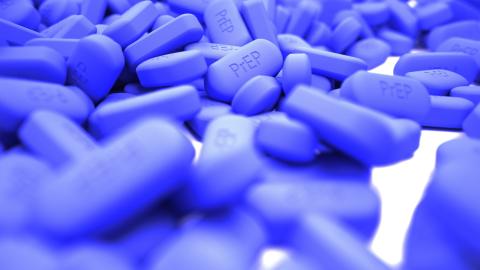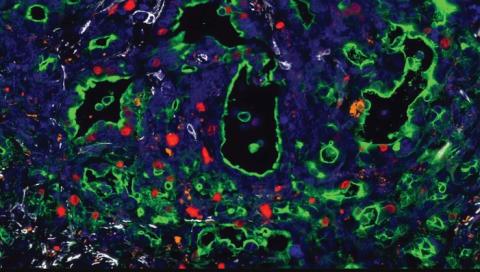Clínic Hospital
If you are the contact person for this centre and you wish to make any changes, please contact us.
Head of the Cardiology Department at the Hospital Clínic de Barcelona and researcher at the National Centre for Cardiovascular Research (CNIC) and at the August Pi Sunyer Biomedical Research Institute (IDIBAPS)
Neurologist at the Hospital Clínic in Barcelona
Head of Microbiology at Hospital Clínic in Barcelona, associate professor at the University of Barcelona, and researcher at ISGlobal Barcelona
Psychiatrist and researcher at the Bipolar and Depressive Disorders Unit of the Hospital Clínic de Barcelona
Head of the Arrhythmias and Physical Activity research group at IDIBAPS, cardiac electrophysiologist at Hospital Clínic Barcelona, associate professor of Medicine at the University of Barcelona and researcher at CIBERCV.
Professor of Psychiatry at the University of Barcelona, Head of the Psychiatry and Psychology Department at Hospital Clínic in Barcelona, and researcher at the Biomedical Research Centre in Mental Health (CIBERSAM)
Psychiatrist and researcher at the Depressive and Bipolar Disorders Unit of the Hospital Clínic de Barcelona
Assistant Doctor of Psychiatry and postdoctoral researcher at the Bipolar and Depressive Disorders Unit of the Psychiatry and Psychology Department of the Hospital Clínic de Barcelona.
Professor of Medicine at the University of Barcelona and coordinator of the Central Sensitisation Unit at the Hospital Clínic de Barcelona.
Research Professor at IDIBAPS-Hospital Clínic de Barcelona and Scientific Director of CIBEREHD - Carlos III Health Institute

The Science group is simultaneously publishing four papers (two in the journal Science, one in Science Immunology and one in Science Translational Medicine) that include advances in a sequential vaccination strategy for an effective HIV vaccine. The methods employed aim to obtain broad-spectrum neutralising antibodies and one of the proposals is already in clinical trials.

The largest meta-analysis to date that studies the risk of children of people with a mental disorder also suffering from some type of mental disorder during their lifetime has been published, with Spanish participation. According to the study, the risk is more than double that of the rest of the population. To explain the study and resolve any doubts that may arise, the Science Media Centre Spain organised an information session with one of the authors, psychiatrist Joaquim Raduà.

An international team, led by the Hospital Clínic-IDIBAPS in Barcelona together with King's College London (UK) and Dalhousie University (Canada), has published the largest meta-analysis to date studying the risk of children of people with mental disorders developing the same, or another type of disorder. The study included more than three million children of parents with different types of disorders and more than 20 million people as a control population. The results, published in the journal World Psychiatry, indicate that, overall, the former have a 1.5 to 3 times higher risk of developing a disorder in their lifetime. According to the authors, in the case of bipolar, depressive or anxiety disorders, the risk of their offspring suffering from some type of disorder is more than 50%.

Apps developed to treat depression may be beneficial in the management of severe and moderate cases. This is the conclusion of a review and meta-analysis that included 13 studies with up to 16 different apps. The results are published in the journal JAMA Network Open.

Researchers at Northwestern University in the United States have studied the effect of a temporary decrease in sleep on the mood of mice. According to their results, the animals became more hyperactive and hypersexual for a few hours. In addition, the occasional lack of sleep had an antidepressant effect that lasted for a few days and is explained by an increase in the release of dopamine. The results are published in the journal Neuron.
The Karolinska Institute has awarded the Nobel Prize in Medicine or Physiology to Katalin Karikó and Drew Weissman for their groundbreaking discoveries, which have radically changed our understanding of how mRNA interacts with our immune system, and made it possible to develop vaccines at unprecedented speed during the covid-19 pandemic.

Pre-exposure prophylaxis (PrEP), which usually consists of taking a daily oral anti-HIV drug, is a highly effective measure to prevent HIV infection. However, it only works well if people strictly follow the protocol, and some people end up not adhering to it. To improve this situation, researchers have tested an implant under the skin of non-human primates that releases the antiretroviral drug islatravir and maintains adequate concentrations for at least 20 months. The results, published in the journal Science Translational Medicine, show complete protection against infection with repeated exposure.

A commentary published last Friday in the journal Molecular Psychiatry, signed by more than 30 researchers, challenges the conclusions of the systematic review published in the same journal in July 2022, in which the authors concluded that there was no evidence that low serotonin levels cause depression. The researchers in the new paper blame the earlier study for flaws in methodology, among other weaknesses.

An international team of scientists, led by Stanford University (United States), has designed a study to analyse the relationship between herpes zoster virus infections and the development of dementia. To do so, they took advantage of the introduction of the Zostavax vaccine against this virus in 2013 in Wales (UK), which people over the age of 80 could not receive. After reviewing data from people around this age over the following seven years, they concluded that the vaccine reduced the relative risk of dementia by 20%. According to the authors, their study, which is in prepublication form and has not been peer-reviewed, "leads to the conclusion that shingles vaccination is most likely an effective way to prevent or delay the onset of dementia".

A phase 1 clinical trial has tested personalised mRNA vaccines against the most common type of pancreatic cancer with a particularly poor prognosis. The treatment, which is tailored to the characteristics of each patient's tumour, was given to 16 people along with surgery, chemotherapy and other immunotherapy. Half of them showed an immune response to the vaccine, which was associated with a better prognosis. The results are published in the journal Nature.